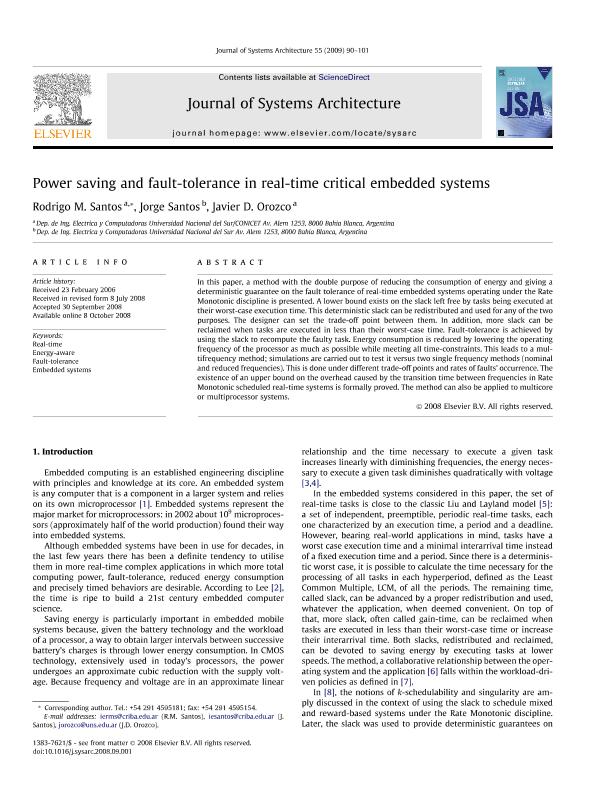Mostrar el registro sencillo del ítem
dc.contributor.author
Santos, Rodrigo Martin

dc.contributor.author
Santos, Jorge

dc.contributor.author
Orozco, Javier Dario

dc.date.available
2020-05-06T22:28:54Z
dc.date.issued
2009-02
dc.identifier.citation
Santos, Rodrigo Martin; Santos, Jorge; Orozco, Javier Dario; Power saving and fault-tolerance in real-time critical embedded systems; Elsevier Science; Journal Of Systems Architecture; 55; 2; 2-2009; 90-101
dc.identifier.issn
1383-7621
dc.identifier.uri
http://hdl.handle.net/11336/104453
dc.description.abstract
In this paper, a method with the double purpose of reducing the consumption of energy and giving a deterministic guarantee on the fault tolerance of real-time embedded systems operating under the Rate Monotonic discipline is presented. A lower bound exists on the slack left free by tasks being executed at their worst-case execution time. This deterministic slack can be redistributed and used for any of the two purposes. The designer can set the trade-off point between them. In addition, more slack can be reclaimed when tasks are executed in less than their worst-case time. Fault-tolerance is achieved by using the slack to recompute the faulty task. Energy consumption is reduced by lowering the operating frequency of the processor as much as possible while meeting all time-constraints. This leads to a multifrequency method; simulations are carried out to test it versus two single frequency methods (nominal and reduced frequencies). This is done under different trade-off points and rates of faults´ occurrence. The existence of an upper bound on the overhead caused by the transition time between frequencies in Rate Monotonic scheduled real-time systems is formally proved. The method can also be applied to multicore or multiprocessor systems.
dc.format
application/pdf
dc.language.iso
eng
dc.publisher
Elsevier Science

dc.rights
info:eu-repo/semantics/openAccess
dc.rights.uri
https://creativecommons.org/licenses/by-nc-sa/2.5/ar/
dc.subject
Real-time
dc.subject
Energy-aware
dc.subject
Fault-tolerance
dc.subject
Embedded systems
dc.subject.classification
Telecomunicaciones

dc.subject.classification
Ingeniería Eléctrica, Ingeniería Electrónica e Ingeniería de la Información

dc.subject.classification
INGENIERÍAS Y TECNOLOGÍAS

dc.title
Power saving and fault-tolerance in real-time critical embedded systems
dc.type
info:eu-repo/semantics/article
dc.type
info:ar-repo/semantics/artículo
dc.type
info:eu-repo/semantics/publishedVersion
dc.date.updated
2020-05-04T13:32:25Z
dc.journal.volume
55
dc.journal.number
2
dc.journal.pagination
90-101
dc.journal.pais
Países Bajos

dc.journal.ciudad
Amsterdam
dc.description.fil
Fil: Santos, Rodrigo Martin. Consejo Nacional de Investigaciones Científicas y Técnicas. Centro Científico Tecnológico Conicet - Bahía Blanca; Argentina. Universidad Nacional del Sur. Departamento de Ingeniería Eléctrica y de Computadoras; Argentina
dc.description.fil
Fil: Santos, Jorge. Universidad Nacional del Sur. Departamento de Ingeniería Eléctrica y de Computadoras; Argentina. Consejo Nacional de Investigaciones Científicas y Técnicas. Centro Científico Tecnológico Conicet - Bahía Blanca; Argentina
dc.description.fil
Fil: Orozco, Javier Dario. Consejo Nacional de Investigaciones Científicas y Técnicas. Centro Científico Tecnológico Conicet - Bahía Blanca; Argentina. Universidad Nacional del Sur. Departamento de Ingeniería Eléctrica y de Computadoras; Argentina
dc.journal.title
Journal Of Systems Architecture

dc.relation.alternativeid
info:eu-repo/semantics/altIdentifier/url/https://www.sciencedirect.com/science/article/abs/pii/S1383762108001410
dc.relation.alternativeid
info:eu-repo/semantics/altIdentifier/doi/http://dx.doi.org/10.1016/j.sysarc.2008.09.001
Archivos asociados
